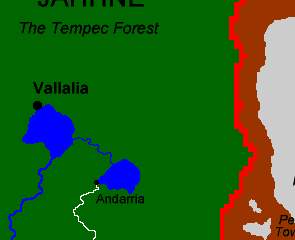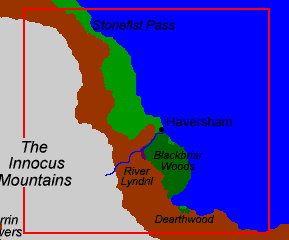
As of 5/3/98


Click Within the Red Box and Examine The Josurrian Reach Close Up!



The Josurrian Reach is an expansive area that lies east of the Innocus
Mountains, stretching from Stonefist Pass in the south northward to the
sea-bound Isles of Heroditus. Much of the reach is rustic wilderness, where
nature is unfettered; it is a land of prey and predator, where deep forests rise
up into rugged highlands, or give way to expansive grasslands in lower
elevations.
Residents of the Josurrian Reach call themselves, "The Free Peoples," and often
are grouped according to clans under a lord who is "first among equals." The
major political power of the region is the Lords Alliance - a loose
confederation of regional rulers who operate under articles known simply as The
Code. Each lord generally has a traditional seat of authority - most often, but
not always, the largest community within the domain - and 6+1d6 villages that
swear allegiance and are under the lord's protection. Most of the villages have
1d6 surrounding hamlets and numerous outlying farms that swear allegiance to the
village elder; thus, they are - in turn - under the lord's political sway and
bound through the village elder to the clan leader.
The historical alignment of the Free Peoples can be classified best as Neutral
Good; individualism is deemed as important as organized effort, provided the
intent of either is of a goodly nature. However, a few of the clans have
shifted alignment in recent years to Lawful Neutral - at least in regards to the
rulers of those realms and the way in which their rule manifests itself. The
lands of Lord Rhutgin and the Connaureigh clan is one such example, having
become more feudal in nature, akin to more "civilized lands" such as the Kingdom
of Langington.
Visitors often are amazed to discover the wide variety of skills and knowledge
possessed by a people that seem, at first glance, to be little more than rustic
commoners devoid of the trappings of more "civilized" climes. The lands of the
Josurrian Reach entail mountains, highlands, expansive forests, navigable
rivers, misty moors, and even bogs and swamps. A great many settlements are
coastal in nature. The end result is that the Free Peoples collectively can
field individuals experienced at prospering on sea, at farming, or in forests,
highlands or swampy bogs. They are also a people given to celebration and lust
for life; bards are looked upon with great favor at both court and village, and
music and song can be seen as much in their religious life as in revelry for its
own sake.
As a general rule, the following weapons are favored by the Free Peoples: long
sword, broadsword, bastard sword, bows other than crossbows, battle axe, hand
axe, dagger, spear, and quarterstaff. It is not unusual to see somebody in
conflict wielding a makeshift club or farm implement, such as a scythe.
The Free Peoples work a great deal with leather goods, so it is not surprising
that it shows up fairly frequently in their armor as well. Common armor types
include leather, studded leather, scale mail (metal discs sewn onto a leather
backing), and half-plate (breast- and back-plates, shoulder and forearm guards,
and greaves worn over leather rather than the chain mail favored in Langington
and several other western nations.
"Diverse be the terrain of my homeland. Highlands, grasslands, forests, and the
sea combine to create a stunning tableau, wherein one may find delight in many
different activities. As such, freedom of movement be important. We favor
leather or studded leather armor, especially when one travels abroad; who knows
when peril might strike along the wilderness paths? If forewarned of battle,
then scale mail or half-plate often adorns those who take up arms in defense of
kith and kin. I myself hath worn all four types of armor; yet, in all, I prefer
studded leather o'er the others because of its practicality. Studded leather
offers a goodly amount of protection without adding any noticeable encumbrance;
thou canst e'en swim in it. Not that I shan't gird myself in half-plate when
facing some invading host, for then the intent be to slay, to drive off those
who would harm village and clan; then thou must stand toe-to-toe with thy foe,
exchanging fearsome blows and defending against the same."
-Dravonen Dolgiiri
of the clan DuBrannach, village of Haversham.
Stone is the building material of choice in the highlands regions of the
Josurrian Reach, as much for its sturdiness as availability. Stone also is
shipped to other locales by highland communities, though wood often is used as
well in those communities further from the quarries, and which makes its way as
well into those communities near forested areas. Fortified villages typically
have walls constructed from thick beams of timber, sealed with pitch and planted
deep, yet still rising to a height exceeding twenty feet above the surrounding
ditch and embankment. Timber walls connect strong, square towers of cut stone -
tall, imposing structures, especially those which serve as barbicans, allowing
entrance and exit into the walled village.
Community:
Haversham is a fairly typical village that sits near the edge of
forested, highland wilderness as the terrain changes to pasture land. Homes
generally are of stone, with wooden roofs. Shops usually are the same, and
often are additions to homes as much as stand-alone buildings. A village
long-house serves as the seat of local government, record hall, and general
all-around meeting place. The market is an outdoor affair, in which pitched
tents provide protection against sun and rain. Haversham also is a village in
two parts: one within a fortified palisade, the other beyond the wall's
confines. Most of the shops, two of the three taverns, the long-house, the
local shrines, the granaries, three communal wells, and a number of homes lie
within the fortifications. Outside the walls are a tavern, two inns, a few
shops, a mill situated alongside the nearby River Lyndril, and more homes,
mostly belonging to those who farm land close to Haversham. The village also
lays claim to a number of outlying farms, a few grassland ranches, and four
stone keeps - two situated along major roads, a third near the forested
environs, the fourth guarding a highland pass. Each keep possesses a signaling
device - a polished disc of metal that will reflect sunlight or firelight - that
can be viewed by Haversham or one of the other keeps.
Haversham is a holding of clan DuBrannach. The village elder is Hrothgar, sire
of the warriors Amlaff and Asmund, father-in-law of Dravonen Dolgiiri. The
DuBrannach clan is led by Lord Harvald from his seat of power at Port Dwar, a
large, walled community protected by an actual stone fortress built alongside a
natural deepwater bay. Fifteen villages swear fealty to Port Dwar and Lord
Harvald, most being situated in the Lyndril Valley.
Clan Politics:
Clan life is neither patriarchal nor matriarchal. The village
elder is dictated mostly by bloodline, being handed down from father or mother
to eldest surviving son or daughter, or by less direct relationship if no
surviving offspring exists; leaders most often are male, but the Free Peoples
willingly follow a competent, well-considered female if such is the choice over
a male of lesser ability. Some of the beloved leaders of the Josurrian Reach
have been, in fact, female.
If a bloodline is eradicated, then a respected, competent member of the clan is
selected by two-thirds vote of village residents. If no candidate exists who is
able to garner two-thirds support of the village, the decision rests with the
clan leader, who also is empowered to remove a village elder with two-thirds
support of the local populace.
Each village elder is advised by two councilors, most often close relatives by
either birth or marriage. The ritualized function of the triad is "For home,
for hearth, for the harvest, for the hunt." The focus is on protecting and
succoring those of the village and clan, inspiring and teaching by word and
deed, and ruling wisely through service, both to the current generation and
those who come after. Likely councilor-candidates are trained to be such by the
existing triad, or by whomever they decide might yield valuable knowledge and/or
skills. If a village elder voluntarily relinquishes the role in favor of
another, he or she often is given the role of unofficial councilor. Councilors
are referred to by the names on a day-to-day basis and as "Speaker", short for
"Speaker of Wisdom", in formal situations.
 Return to the Kingdoms Page.
Return to the Kingdoms Page.
 Return to the Mystery of the Malgwaith Main Page.
Return to the Mystery of the Malgwaith Main Page.
This page hosted by  Get your own Free Home Page
Get your own Free Home Page








 Return to the Kingdoms Page.
Return to the Kingdoms Page. Return to the Mystery of the Malgwaith Main Page.
Return to the Mystery of the Malgwaith Main Page.